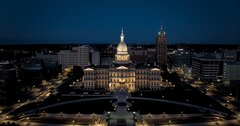
The wealthy are always taking hits from those whom they patronize — often from arts journalists who think the wealthy are philistine, stingy or some combination of the two. Enter Matthew Power, a Brooklyn-based scribe, who in the September issue of GQ authors a sneering, condescending and downright elitist article on Grand Rapids in general and its ArtPrize specifically.
First of all: Brooklyn? Not that I mind the little town Thomas Wolfe famously wrote that only the dead know, but in all honesty (and with tongue still planted firmly in cheek) there exists no Museum of Modern Art or Whitney in Brooklyn. For such world-class art, Brooklyn folks need to head to Manhattan.
Apparently, Power thinks Brooklyn’s proximity to Manhattan is close enough to disparage poor Grand Rapids as “flyover country,” “provincial,” and “G.R.-usalem” as well its inhabitants “ordinary.” Apparently, Grand Rapids hosts quite a few churches of a conservative nature, something heretofore unheard of in New York — but, alas, the norm in such cities as Rome, London and Paris, which coincidentally also host some pretty nice art galleries, I’m told.
And so our intrepid reporter slogs it from the hustle-and-bustle of NYC to the Thornton Wilder-esque hinterlands of Grand Rapids to offer a snarky analysis of the Midwestern overreach that is ArtPrize, the city’s annual visual-arts competition. It seems the first-place prize of $250,000 is determined by public vote. How dare they? Aren’t they aware that the public is qualified only to judge county fair cuisine and 4-H livestock?
Power notes: “Everywhere I went, throngs of viewers milled about, appraising works of art like fairgoers sampling sideshows at a carnival…. What’s most extraordinary is the jury: Anyone 16 or older who comes to Grand Rapids for the occasion can be in on it. The winner is chosen by popular vote,” he sarcastically adds. Positioning himself as a 2012 version of H.L. Mencken peering over his spectacles at the booboisee, Power postulates that the majority of these Jethros and Ellie Maes have never judged art before.
GR’s Rick DeVos takes it on the chin via Power’s prose simply because the young man is impertinent enough to organize a citywide festival of art that injects an estimated $15.4 million of economic activity into the city and attracts 200,000 out-of-town visitors. And then there’s that $250,000 first prize, compared to the Guggenheim’s Hugo Boss Prize of $100,000 and the Turner Prize’s $40,000. That money, Power implies, would be much better allocated by a select few judges who unnerstan’ art better than Grand Rapids bohunks and Babbitts.
Ultimately, Power gets to his main point, which readers could easily anticipate as leveling a charge of what is perceived as the only sin known to Western Civilization by East Coast writers of a particular persuasion: hypocrisy. For it seems Rick DeVos’ parents fund free-market (including the Mackinac Center) and conservative Christian causes, and young Rick’s motivations are judged negatively by Power’s perceived “sins” of DeVos’ mere et pere and the causes they fund.
“To some of the [DeVos] family’s detractors, the millions in soft money and the funding of conservative Christian organizations suggest more ambitious goals: an end to nearly all government control and regulation, media, education … and the arts,” Power cavils. “Whatever their motives, it seemed odd that a family with such an agenda would let its heir apparent throw open the gates to its city in an open call to any and all artists, not matter how starving or unwashed.”
Power notes that the Acton Institute, a beneficiary of DeVos monies, “has advocated for the abolition of public funding for contemporary art” when, in fact, Acton has no official position whatsoever on the matter. True, some Acton articles and blog posts (several written by your author) take issue with public funding for art, arguing along with Jacques Barzun that the practice results in a “surfeit of fine art” (and I would argue strenuously against DeVos applying for and accepting a $100,00 National Endowment for the Arts grant for ArtPrize, as the businesses benefitting most from the competition could easily pony up the relatively insignificant amount) but, again, my opinions and for that matter the free-market ideology of Mr. DeVos’ parents hardly are germane to a story that merely aims to discredit ArtPrize by any means necessary.
Power winds up his Grand Rapids’ hit piece with interviews with the losers, apparently cheesed off that the public judging was insufficient to their superior aesthetic concepts and artistic execution. But, of course, that’s to be expected.
However, the disgruntled artists knew they were rolling the dice from the onset. What’s apparent is they — and Power — desire loaded dice that favor their efforts over the eventual winners, largely through publicly funded arts education programs for what they see as an ignorant public, additional public largesse for their work and privately judged competitions that favor the chosen artistic few.
Get insightful commentary and the most reliable research on Michigan issues sent straight to your inbox.

The Mackinac Center for Public Policy is a nonprofit research and educational institute that advances the principles of free markets and limited government. Through our research and education programs, we challenge government overreach and advocate for a free-market approach to public policy that frees people to realize their potential and dreams.
Please consider contributing to our work to advance a freer and more prosperous state.